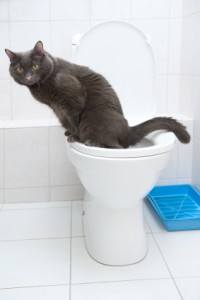Marking or toileting?
 Spraying small amounts of urine against vertical objects such as chairs or walls is a territorial marking behaviour. Male and female cats urinate in a squatting position leaving a greater volume of liquid.
Spraying small amounts of urine against vertical objects such as chairs or walls is a territorial marking behaviour. Male and female cats urinate in a squatting position leaving a greater volume of liquid.
Why do cats spray?
- Entire male cats are the most likely to spray
- Medical problems such as cystitis, diabetes, kidney disease and obesity exacerbate abnormal toileting behaviour.
- Anxiety and stress are the most common causes of spraying. Cats are creatures of habit and like to have their own space and toys. Even though they are willing to share a house and bed with you they need places and things of their own to be happy. If they think that something that belongs to them is being taken over by someone else they feel threatened. They have to let everyone know that it is theirs. The natural way to stake their claim is to mark it with the facial scent glands or urine. This is like writing their name on their things. Putting urine or facial scent on a thing or place makes a cat feel secure, especially if they feel out of place, nervous or afraid.
What makes cats anxious?
- A new cat or kitten. Introduce a new pet into the household gradually. Let them get used to each other through a screen or glass door. Exchange their bedding and let them sniff and sleep on it. Remember to reassure and cuddle the established pet as well as the cute new one.
- A new baby. Let your cat hear the sounds and sniff the clothes of a new family member from a safe, private place. Give the cat lots of attention.
- Changes in furniture or carpets and disruptions such as building or painting. Lock your cat in a room well away from tradesmen and the strange sounds and smells associated with their work.
- A strange cat wandering in the garden or even through the cat flap.
- The loss of a human or animal companion. Strongly bonded cats will need extra care and attention if mourning a friend who has moved or passed away.
- Incompatible cats, especially if a lot of cats live together. Determine which cats do not get along and keep them in separate parts of the home with their own litter and sleeping areas.
- Stress. Enriching a cat’s environment minimises stress.
Cat scratching posts, toys that mimic prey, tunnels, outside runs and a variety of high spots and hideouts will keep your cat happy and stimulated. Vertical space is often more important than horizontal space. Some cats appreciate an indoor garden sown with grass, cat nip and cat mint. Find several toys they like and rotate them regularly. Your company is important. Even an old cat will appreciate a game with a ribbon on a stick or a glittery ball. Make your cat work for food by hiding it in various locations around the house or in food puzzles such as plastic containers with holes cut in the sides. More stress-busting suggestions for the indoor cat.
Routine is important for some cats. Ten minutes each day play and grooming your cat to provide regular predictable attention that helps reduce their anxiety. Feed them at a set time.
What if I can’t identify or remove the source of the anxiety?
If you cannot identify or remove the source of the anxiety then provide your cat with a safe haven. A room where your cat can safely retreat or relax without fear of disturbance is ideal. A small, enclosed and elevated space lined with your worn clothes is also good. Most cats will mark a limited space with facial rubbing and bunting only.
Clean urine marked areas with a special enzymatic cleaner like Urine Off that eliminates the scent. If your cat can smell urine he will mark it again. You may have to lock him out of the room for a while to help him forget it.
Protect a habitual spraying site by placing dry food or a bed at the base. Cats are usually reluctant to spray their own key resources. Food and beds are also reassuring and may reduce anxiety. However, a stressed cat may move to other areas and mark there instead.
A natural pheromone spray called Feliway calms some cats and reduces the urge to spray and mark. Spray it on previously marked areas or plug a Feliway diffuser in or near the area he most marks.
Never punish cats. If caught in the act they can be picked up and placed on the litter tray, stroked and calmed. Never “rub the cat’s nose in it” as this will make a nervous cat even more likely to toilet indoors.
Cats with anxiety related behaviours like spraying often need anti-anxiety medications in addition to the above changes to resolve the problem.
